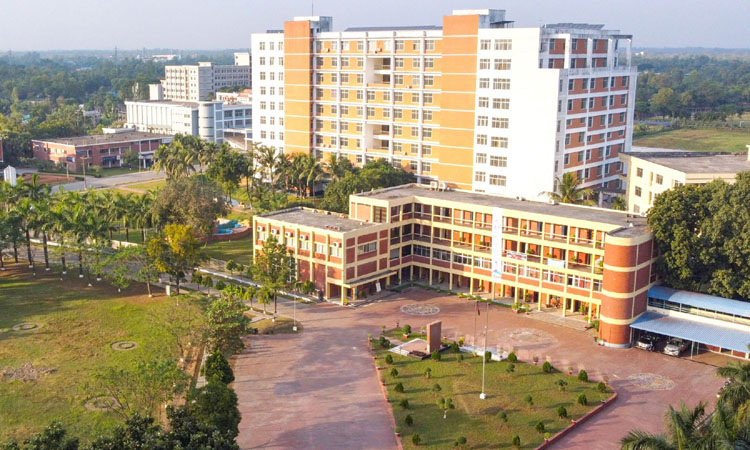News Flash

DHAKA, Nov 11, 2025 (BSS) - The government has advanced a major initiative aimed at strengthening higher education and research in agricultural arena through improving infrastructures at Gazipur Agricultural University under a Taka 567.29 crore project.
The “Infrastructures Development of Gazipur Agricultural University” project was approved by the Executive Committee of the National Economic Council (ECNEC) in its meeting yesterday.
The project, mooted by the Secondary and Higher Education Division of the Ministry of Education, carries an estimated cost of Taka 567.29 crore, to be financed entirely by the Government of Bangladesh (GoB).
The project area falls under Gazipur City Corporation in Gazipur District, an emerging education and industrial zone within Dhaka Division. Officials have expressed optimism that the new infrastructure will help the university achieve improved international ranking, attract foreign students, and enhance Bangladesh’s profile in agricultural education and research.
Talking to BSS, a Planning Commission official said, the project is designed to support the long-term vision of enhancing agricultural productivity, developing skilled manpower, and uplifting the overall standard of agricultural education in Bangladesh. The implementation period is scheduled from October 2025 to September 2028, or three years from the date of ECNEC approval, whichever is later. The University Grants Commission (UGC) and Gazipur Agricultural University will jointly execute the project.
“The project—once completed—will significantly improve the quality of agricultural higher education while ensuring international accreditation-ready facilities. It will pave the way for improved academic standards, state-of-the-art laboratories, and modern research environments that cater both to graduate and postgraduate students,” said the official.
The Commission further noted that the project will contribute to creating a well-trained, proficient workforce critical for the modern agricultural economy, and will reduce reliance on foreign technical expertise.
The project highlights several major construction activities, including the establishment of two large-scale academic buildings—each with 10-storey structures underpinned by 10-storey foundations—for the Faculty of Forestry and Environment and the Faculty of Agricultural and Bio-resource Engineering.
In addition, the existing Faculty of Agricultural Economics and Rural Development building will undergo vertical expansion from the 5th to the 10th floor to accommodate increasing academic demand. The proposal also includes the construction of a modern sports complex, internal road networks, and a boundary wall to ensure a safer and more organized campus environment.
To support teaching, research, and laboratory-based learning, the project provides for the procurement of essential laboratory equipment and office instruments. These will enhance the capacity of the university to carry out advanced research in fields such as climate-smart agriculture, soil management, agribusiness, biotechnology, and sustainable farming practices.
Furniture will also be procured for classrooms, dormitories, international complexes, and research labs to ensure modern educational facilities of the university.
The Planning Commission official emphasized that student-centric infrastructure development—including upgraded classrooms, multipurpose galleries, and research laboratories—will contribute significantly to improving the quality of academic services.
Furthermore, procurement of vehicles has been proposed to facilitate study tours, field visits, and practical exposure at major agricultural and rural development research institutions, enabling students to gain hands-on experience and broader insights.
The Commission noted that the expected impact of the project extends beyond academic development. By strengthening agricultural research capacity, the university will be in a position to contribute more effectively to national policies and innovations in the agricultural sector. This aligns with the government’s strategic goal of ensuring food security, enhancing rural livelihoods, and encouraging sustainable agricultural practices.
A feasibility study of the project has already been conducted by Sheltech Consultants (Pvt) Ltd, as per the guidelines issued in June 2022 regarding project formulation and approval in the public sector. The study validated the technical soundness, economic justification, and long-term viability of the initiative.